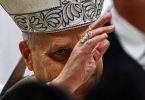
by Catholic News Service
ACCRA, Ghana (CNS) — As Ghana’s national soccer team, the Black Stars, joins other national teams for the 2022 FIFA World Cup in Qatar, some Ghanaian citizens have been talking about Iñaki Williams, who was named after a Catholic priest.
His parents, Ghanaians Felix Williams and Maria (Mary) Arthuer, crossed the Sahara and, when they got to Morocco, jumped the border fence to Melilla, one of two Spanish cities in North Africa. The Guardian reported that, on the advice of a lawyer, they said they were from Liberia to apply for political asylum. They ended up in Bilbao, Spain.
A Caritas volunteer, then-Deacon Iñaki Mardones, was instrumental in helping them when they arrived in Bilbao.
“I went to pick them up at Abando [railway] station,” Father Mardones told La Provincia, a Spanish magazine. At the time, Maria was seven months pregnant.
“I remember them with the suitcase and the uncertainty on their faces,” Father Mardones told La Provincia. The report on them said they understood Spanish, “but when I started to speak they looked at me without understanding anything. When I switched to English they sighed in relief.” He helped them to an apartment used by Caritas, and even helped them get to the hospital for their child’s birth.
Iñaki Williams, born June 15, 1994, was named after Father Mardones, who later baptized him and gave him his first soccer uniform.
“That’s where we put the seed,” Father Mardones told La Provincia.
Williams, a striker, is one of the newly called-up players of the Black Stars. The 28-year-old has made more than 200 appearances for Spain’s Athletic Bilbao club team and has scored more than 40 goals.
Around the time of his Spain debut in 2016, Williams was being watched by a Spanish scout from Ghana’s national team.
In 2021, he told The Guardian he would not play for Ghana because “I feel Basque and can’t con anyone.”
“And my mum knows how people live football there: It’s quite something, and she’d be worried about me,” he said.
However, on July 5, 2022, Williams announced that he was making himself available to Ghana in time for the World Cup. FIFA rules stipulate players can switch countries if they have not played more than three matches for a country before the age of 21 and have not played in a World Cup or continental tournament.
In announcing that he would play for Ghana, Williams said his parents “taught me to embrace life” and that he was working to evolve personally and professionally.
“That’s why I feel the moment has come for me to find my origins within myself and with Africa and Ghana, which means so much to me and my family. I want to return a small part of everything it has given to us, because Ghana has played a significant part of becoming who I am as a person, as a son and as a brother.”
In September, he received his first call-up to Ghana’s national team, for friendlies with Brazil and Nicaragua.
Williams’ switch comes as a boost for Ghana ahead of this year’s World Cup. Ghana has been grouped with Portugal, Uruguay and South Korea in the first round, which begins Nov. 20.
Ernest Buamah, a former youth leader of the Archdiocese of Accra and CEO of Green Sports Academy, told Catholic News Service he has been watching Williams play club ball and play for the Black Stars.
“He has some qualities that can make us compete competitively at the World Cup,” he said.
John Buabe, a parishioner of Our Lady of Assumption Parish in Accra, offered this critique: “His movement for balls is fantastic. If he get supplies, he will make amends. He has the speed and can also handle the ball. He is always on target for goals, and he is not selfish.”
Williams was featured in the 2018 Amazon Prime television documentary series “Six Dreams,” “a real-life look into the Spanish Football League (La Liga) through the perspective of six individuals.”






